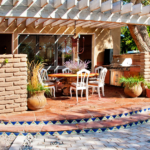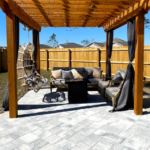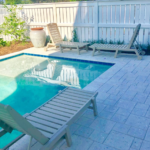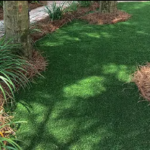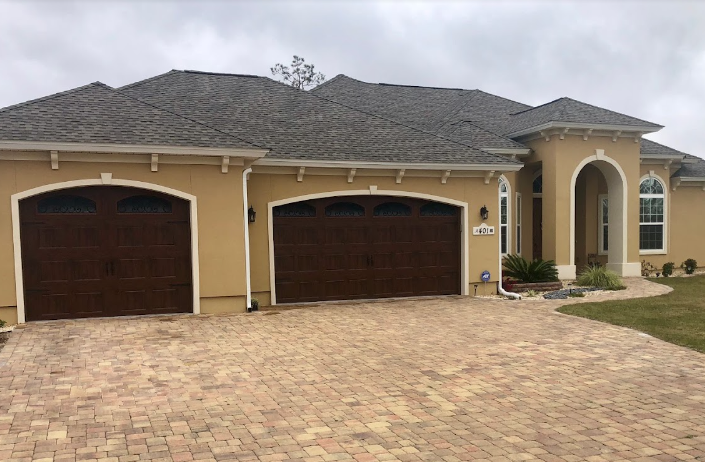
Paver Materials
Using the best paver materials is a key aspect in getting the best pavers in Northwest Florida. When you look at your residential or commercial outdoor space, does it look and feel like something is missing? Whatever that feel is we can change it by an exquisite and functional paver design and installation by our experienced team of paver experts. We encourage you to call or visit with us today! You can reach our team at 850-785-1333 or call to schedule an appointment at 770 Airport Rd., Panama City, Florida or your location in the Panhandle.
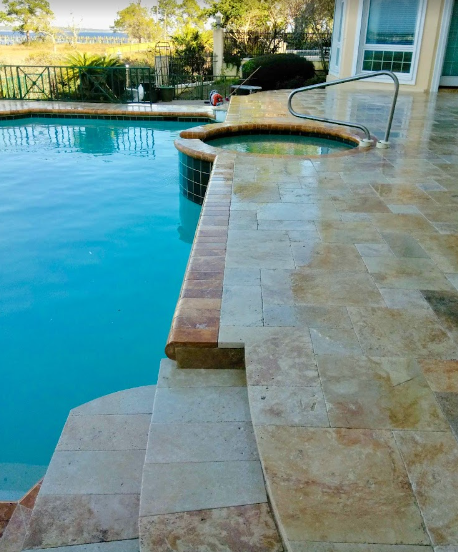
What Are Pavers
Pavers can be described as slabs and blocks made from a variety of materials such as brick (clay), concrete, flagstone, marble, travertine, porcelain, rubber and even plastic to create distinctive outdoor living spaces. Pavers can be an ideal alternative to concrete projects for driveways, pool decks, patios, walkways, etc.
Types Of Pavers
Pavers are available in a variety of materials and selecting the best paver material for your specific paver installation is critical to your overall installation satisfaction.
- Brick: Brick pavers are made from molded clay that is baked in a kiln and set into a mortar or sand base for its installation. Brick pavers offers considerable variation in texture, character and color to create a showplace for your property in pavers.
- Concrete: Concrete pavers are made from concrete and come in many shapes and sizes. They come in a wide range of colors, sizes, textures and thicknesses.
- Bluestone: Bluestone pavers is a variety of sandstone that is often used to create elegant and sistainable driveways. It comes in a wide variety of sizes and shapes. They can be crushed into gravel, left in more massive slabs or cut into distinct patterns of tiles.
- Flagstone: Flagstone pavers are striking. It is a sedimentary rock that is uses as pavers most often in patios. They are uniquely shaped and fit together like a puzzle. Flagstone pavers are a thinner paver, compared to brick and concrete pavers. They are not to be used in driveways.
- Marble: Marble pavers are formed when limestone is exposed to extremely high heat and pressure. The process of creating marble pavers results in randomly disarranging crystal particles explaining its unique pattern.
- Travertine: Travertine pavers is an all-natural material. It is sedimentary rock formed and developed under pressure and changing temperature.
- Porcelain: Porcelain pavers are a clay-based material, treated with extremely high temperatures to create a hard and durable surface with a non-porous finish. With advanced technology in place, porcelain pavers can now be produced in greater thicknesses to produce natural looks like wood, stones, etc.
- Cobblestone: Cobblestone pavers are generally made of granite although sometimes basalt, limestone or sandstone.
- Rubber: Rubber pavers are usually made of recycled materials.
- Plastic: Plastic pavers can be newly manufactured or recylcled from plastic waste.
- Gravel: Gravel pavers is also known as crushed stone and is an aggregation of unconsolidated rock fragments. Basalt, sandstone and limestone are common rocks to create gravel pavers.
- Greencrete: Greencrete pavers are made out of industrial waste materials, marine sources and natural resources like algae.
- Granite: Granite pavers is a light-colred rock with visible grains, generally composed of quartz, alkali feldspar and plagioclase. It forms when molten materials cool and solidify below our earth’s surface.
- Limestone: Limestone pavers make up about a tenth of all sedimentary rocks.
Paver Styles & Installation
Our paver specialists are fully equipped and experienced for devising interesting styles and patterns for your residential or commercial installation. Each paver material will be handled differently in order to make sure that the material is displayed at its best. There is certainly no one size fits all approach to creating the most inviting and extraordinary paver installation! All paver materials, regardless of being the best in quality, come with pros and cons. That is where our team will deliver precise paver material information to guide you in making the best paver design and installation decision.
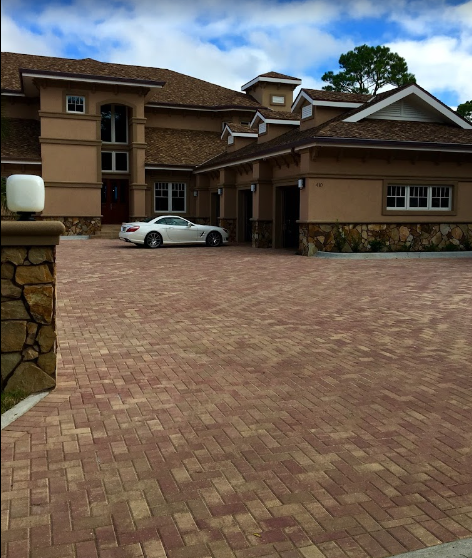
Choosing Pavers
Besides considering the advantages and disadvantages of each paver material, the location of the paver installation determines which paver material will perform best for your project. Making the right paver material decision the first-time will add to your overall paver installation satisfaction. Paver installations are not inexpensive by any means and it is our responsibility to provide detailed information on which paver materials will perform to project expectations. We have your best interest in mind when it comes to providing paver material details that will inform you on what paver material will meet your project performance requirements.
Paver Patterns
Interlocking patterns and flat surface paver patterns are the two main paver patterns. Interlocking patterns interlock the pavers and flat surface patterns are laid out to create a flat surface.
Paver Colors
Paver materials come in a wide variety of colors, including:
- Beige
- Brown
- Gray
- Red
- Pewter
- Slate
- Tan
Sealing Pavers
The proper sealing of pavers can protect the pavers from moss, mold and algae. It is important to note that sealing pavers will not prevent normal wear and tear like scratches, but it can certainly limit the growth of undightly mold and other things that could result in paver discoloration over a period of time. Oily stains can somewhat be prevented with a sealing application. We will discuss the sealing process in detail so you are fully aware of the pros and cons of sealing.
Permeable Pavers
Permeable pavers are usually made of brick (clay) or concrete. These two types of pavers allow rainwater to pass around them versus than through them and that may make them last longer. Permeable pavers usually have wider, more open joints which help to move the water between them as it enters the base layer underneath.

